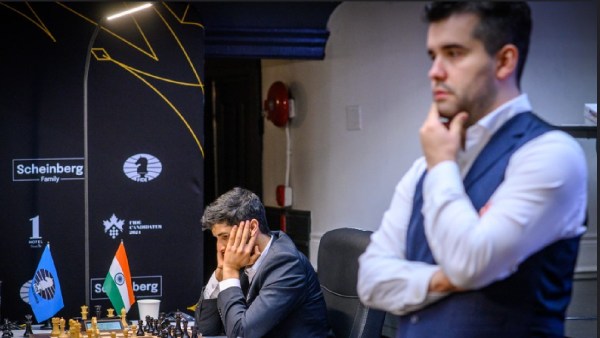In the world of chess, where strategic thinking and mental fortitude reign supreme, the image of a stoic player, maintaining a calm and composed demeanor, is often celebrated as the epitome of professionalism. However, amidst the sea of impassive faces and silent contemplation, there exists a subset of players who wear their emotions on their sleeves, adding a captivating layer of drama and intensity to the game.
Scowling, banging pieces, and wild expressions are all part of the repertoire of emotional players who bring a theatrical flair to the chessboard. While the traditional view of chess may emphasize stoicism and restraint, the presence of emotional players injects a sense of unpredictability and raw energy into the game, captivating audiences and adding to its allure as a spectator sport.

SOURCE:- BBC NEWS
One of the most iconic examples of an emotional chess player is the legendary Bobby Fischer. Known for his fiery temperament and intense outbursts during matches, Fischer’s emotional intensity became as much a part of his persona as his exceptional chess skills. His battles with Soviet players during the height of the Cold War era were as much psychological duels as they were contests of strategy, with Fischer’s emotional outbursts adding an extra layer of tension and drama to the proceedings.
SOURCE:- BBC NEWS
Similarly, the modern era of chess has seen the emergence of players like Hikaru Nakamura, whose animated reactions and expressive demeanor have made him a fan favorite. Nakamura’s passionate displays of emotion, whether it’s pumping his fist in triumph or shaking his head in frustration, add a human element to the game, reminding viewers that even the greatest chess players are not immune to the highs and lows of competition.
While emotional players may sometimes be criticized for their lack of stoicism, their contributions to the theater of chess should not be underestimated. Their passionate displays serve to heighten the intensity of the game, drawing spectators into the drama unfolding on the board. Whether it’s the tension of a closely contested endgame or the exhilaration of a brilliant sacrifice, emotional players bring an added dimension of excitement to the world of chess.
Moreover, the contrast between stoic and emotional players creates a dynamic interplay that enriches the overall experience of the game. Just as in other sports, where rivalries and personalities add spice to the competition, in chess, the clash between stoicism and emotionality adds depth and complexity to each encounter, elevating it from a mere intellectual exercise to a riveting spectacle of human psychology and emotion.
In the end, whether stoic or emotional, each chess player brings their own unique style and personality to the game, enriching it in their own way. While the stoic player may embody the ideal of calm and rationality, the emotional player adds a touch of passion and intensity, reminding us that even in the world of chess, emotions can run deep.
Share your views in the comments

